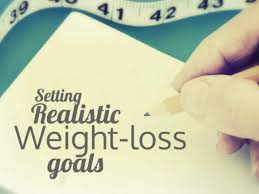
Introduction: Embarking on a weight loss journey is a significant step towards improving health, increasing vitality, and enhancing overall well-being. However, setting realistic weight loss goals is crucial for success, as unrealistic expectations can lead to frustration, disappointment, and ultimately, abandonment of the journey. In this extensive guide, we will explore the principles behind setting realistic weight loss goals, providing you with the knowledge and strategies to achieve sustainable and lasting results.
Understanding Weight Loss Goals: Before diving into the specifics of goal setting, it’s essential to understand the fundamentals of weight loss and the factors that influence success on the journey. Weight loss occurs when the body burns more calories than it consumes, resulting in a negative energy balance that prompts the body to tap into stored fat for fuel. While the concept of weight loss may seem straightforward, achieving and maintaining a healthy weight requires a comprehensive approach that encompasses diet, physical activity, mindset, and lifestyle habits.
Factors Influencing Weight Loss Success: Several factors influence the success of a weight loss journey, including:
- Individual Physiology: Each person’s metabolism, body composition, and genetic predispositions play a role in how their body responds to diet and exercise.
- Lifestyle Habits: Dietary choices, physical activity levels, sleep patterns, stress management, and other lifestyle factors can impact weight loss outcomes.
- Mindset and Motivation: A positive mindset, clear motivation, and realistic expectations are essential for staying committed to the journey and overcoming obstacles along the way.
- Support System: Having a supportive network of friends, family, or professionals can provide encouragement, accountability, and guidance throughout the weight loss process.
Setting Realistic Weight Loss Goals: When setting weight loss goals, it’s essential to approach the process with a realistic and holistic mindset, considering both short-term and long-term objectives. Here are some key principles to keep in mind:
- Be Specific: Clearly define your weight loss goals in terms of pounds or percentage of body weight to be lost. Set a specific target date or timeframe for achieving your goal to create a sense of urgency and focus.
- Be Realistic: Set goals that are achievable and realistic based on your current lifestyle, habits, and circumstances. Avoid setting overly ambitious goals that require drastic changes or unsustainable practices.
- Focus on Health: Instead of fixating solely on the number on the scale, prioritize health-related goals such as improving nutrition, increasing physical activity, reducing body fat percentage, or lowering risk factors for chronic diseases.
- Break it Down: Break your overall weight loss goal into smaller, manageable milestones or targets. Celebrate each milestone achieved, no matter how small, to stay motivated and encouraged on the journey.
- Consider Non-Scale Victories: Acknowledge and celebrate progress beyond the scale, such as improved energy levels, increased strength and endurance, better sleep quality, and enhanced mood and confidence.
- Set Behavior-Based Goals: Focus on establishing healthy habits and behaviors that support weight loss, such as meal planning, portion control, mindful eating, regular exercise, and stress management techniques.
- Adjust as Needed: Be flexible and willing to adjust your goals and strategies based on feedback from your body and progress towards your objectives. It’s okay to recalibrate your goals as you learn more about what works best for you.
Strategies for Goal Achievement: Once you’ve set realistic weight loss goals, it’s essential to implement strategies and tactics to help you stay on track and achieve your objectives. Here are some effective strategies to consider:
- Create a Plan: Develop a comprehensive weight loss plan that outlines specific actions, behaviors, and habits to support your goals. Include strategies for meal planning, exercise, accountability, and self-care.
- Track Your Progress: Keep track of your food intake, physical activity, weight changes, and other relevant metrics to monitor your progress towards your goals. Use a journal, app, or tracking tool to record your daily habits and behaviors.
- Seek Support: Surround yourself with a supportive network of friends, family, or professionals who can provide encouragement, accountability, and guidance throughout your weight loss journey. Consider joining a support group, hiring a personal trainer, or working with a registered dietitian to enhance your success.
- Stay Consistent: Consistency is key to long-term success on a weight loss journey. Stick to your plan, even on days when motivation is low or progress seems slow. Focus on making small, sustainable changes over time that add up to significant results.
- Practice Self-Compassion: Be kind to yourself and practice self-compassion throughout the weight loss process. Embrace setbacks and challenges as opportunities for growth and learning, rather than reasons for self-criticism or discouragement.
- Celebrate Achievements: Celebrate your successes, no matter how small, to acknowledge your hard work and dedication. Reward yourself with non-food treats or activities that align with your health and wellness goals.
- Stay Flexible: Be flexible and adaptable in your approach to weight loss, recognizing that progress may not always follow a linear path. Adjust your goals, strategies, and expectations as needed based on feedback from your body and experiences along the way.
Conclusion: Setting realistic weight loss goals is a crucial step towards achieving sustainable and lasting results on your journey to better health and well-being. By understanding the principles behind goal setting, focusing on health-related objectives, and implementing effective strategies for success, you can create a roadmap that guides you towards your desired outcomes. Remember to be patient, persistent, and proactive in your approach, and celebrate each milestone achieved along the way. With determination, dedication, and a positive mindset, you can reach your weight loss goals and create a healthier, happier, and more vibrant life for yourself.